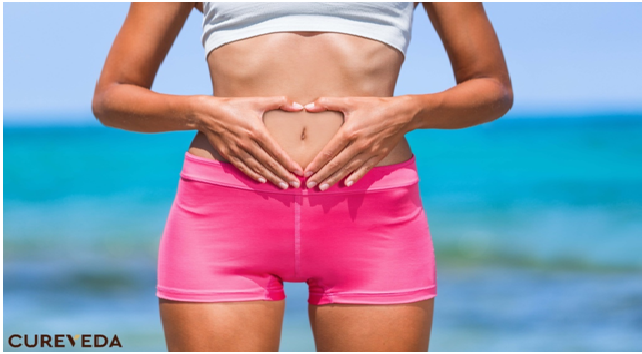These Amazing Food Will Keep Your Uterus Healthy

In a woman’s body uterus is the most sensitive and vital organ. It is the foundation of the female reproductive system. Uterus helps to nourish and protect the developing of the foetus. Hence, it is extremely essential to keep your uterus healthy for maintaining a good pregnancy as well as a fit life.
The uterus can be affected by many abnormalities such as PCOS (polycystic ovarian syndrome), fibroids and endometriosis, infection, prolapse, uterus pain, UTI etc. A healthy uterus is a key to healthy fertility. Environmental factors, hormones, stress, healthy menstrual cycle, circulation and diet matters a lot when it comes to fertility.
The healthy uterus can avoid and heal many menstrual disharmonies including, painful periods, endometriosis, dysfunctional uterine bleeding and infertility.
You can also try herbal and natural supplements to boost your uterus’s health. Multivitamins are an extremely important overall supplement you can try. Women who are trying to get pregnant are recommended to take folic acid supplements.
You merely have to put too many efforts to keep your uterus fit. Simple lifestyle, planned nutrition and a vigorous diet are required for a healthy uterus. Your body is always in a need of diet which is well-off vitamin D, antioxidants and omega-3 fatty acids etc.
Here are some eating habits that will give you optimal uterine health!
- Leafy vegetables
Leafy veggie like spinach, lettuce, kale, etc., helps you maintain alkaline balance and provide vital nutrients such as minerals and folic acid that ensures optimal functioning. Almost all the vegetables are the vital source of calcium, potassium, magnesium and vitamins that can slow down the progress of fibroids in the uterus. Avoid consuming raw and cold foods and alcohol during your periods.
- Green Tea
Very few people are aware of the fact that along with skin and healthy green tea is beneficial for uterus also.
Green tea is a huge source of antioxidants that not only help to maintain healthy uterus and ovaries but also treat fibroids in the uterus. 8 weeks of green tea can drastically reduce fibroids. 8 weeks of green tea will help to reduce a large number of fibroids from uterus.
- Lemon
Lemon is a source of vitamin C; it is now a universal fact that green tea is rich in anti-oxidants and potassium. It can help increase in the immune system. Lemons help in warding off unwanted bacteria and prevent dangerous infections to the uterus and ovaries. Consume a glass of warm water with a lemon squeezed into it every day in the morning to improve metabolism.
- Whole Grains, Nuts and Seeds
Nuts and seeds are required for optimal production of hormones; whole grains are an excellent source of fibre. Whole grains aid optimal functioning by flushing out the excess estrogen from the body.
While nuts and seeds are rich in omega-3 fatty acids are high in good cholesterol. Omega-3 fatty acids are a vital source of removing the fibroids along with the prevention of uterine cancer. 30% of women suffering from pelvic diseases have a lower than average intake of folic acid and beta-carotene say experts.
- Castor Oil
Castor oil can be used in day to day life. It is used for beauty and health purposes. It can also treat ovarian cysts and uterine fibroids and the presence of ricinoleic acid in castor oil helps to strengthen the immune system. It also helps to maintain the digestive system of the body and eliminate the toxins from it.
- Berries
Powerful antioxidants are present in barriers which can help protect the ovaries from free radicals. Berries can protect the ovaries and uterus from many conditions. You can even try using berries in salads and smoothies. Loaded with natural antioxidants and anti-inflammatory phytonutrients blueberries and raspberries can help you increase fertility.
- Dairy Products
Rich with vitamin D Yoghurt, cheese, milk and butter are such products which you should consume on daily basis. These products will help to maintain uterine health. Vitamin D helps the prevention of uterine fibroids. Including dairy products in your daily meal will also improve the health of the bones.
- Cold Water Fish
Cold water thrives fishes like mackerel and salmon can help you with omega-3 essential fatty acids. Add these fishes at least three times a week in your meal to reduce the production of prostaglandin.
- Fruits
Rich in vitamin C and bioflavonoids fruits are the most amazing source of the impending growth of fibroids in your uterus. Good amount of fruits intake can normalize the oestrogen levels in your body and also prevent ovarian cancer. Well, as they say ‘an apple a day, keeps a doctor away’ you eat a good dose of fruits and uterus problems will remain away from you.
- Broccoli
High fibre food is extremely essential for our body. Rich fibre food like Broccoli helps to eliminate the toxins from your body. This can help you remove excess oestrogen that may be stored in your body and prevent the formation of uterine problems.
- Sesame Seeds
Enriched with zinc and monosaturated fats these seeds will help the production of hormones responsible for optimum egg health. You can also add hummus to your diet as it contains tahini (sesame seed paste) to increase embryo health. Adding sesame seeds in your cereals and salad can also make it a tasty option.
Here is a list of vitamins, minerals and acids that you need for the healthy uterus. You can also find them in some online herbal supplements with proper guidance.
Iron
Folic Acid
Vitamin B12
Omega-3 Fatty Acids
Vitamin D
Calcium & Magnesium
Here are some tips you can try to avoid uterus diseases
- Keep yourself away from alcohol and smoking.
- Maintaining urinal hygiene
- Drink a good amount of water every day.
- Maintain sexual and virginal hygiene.
- Maintain a healthy weight
- Avoid long use of birth control pills
- Avoid sitting for long periods of time
- Say no to processed and packaged foods.
When to see your doctor?
If your body is showing symptoms like irregular menstrual periods, vaginal discharge, pelvic pain or discomfort, low back pain, trouble urinating, difficulty becoming pregnant, an enlarged abdomen then you should consult your doctor at the first place.






